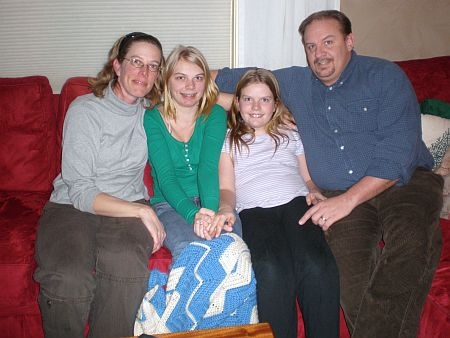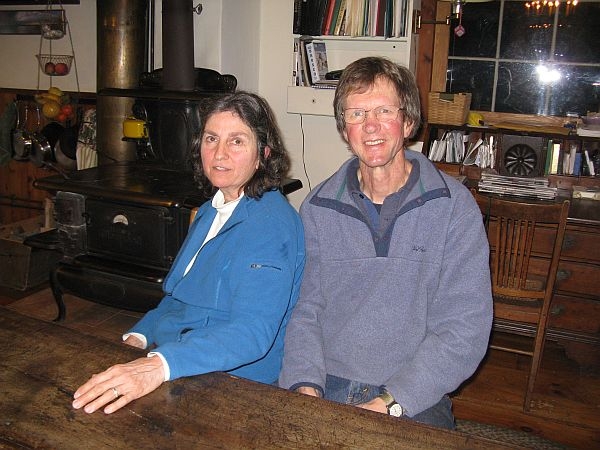
(Host) For 38 years the Vermont Yankee nuclear power plant has generated electricity in the southeast corner of the state.
For at least that long, it’s generated bitter debate throughout the state – and especially in Windham County. Differences of opinion about nuclear power have spawned separate cultures, each with its own version of the truth about Yankee.
VPR’s Susan Keese talked to families who live near the plant, but occupy opposite sides of the nuclear divide.
(Radio) Beep. "Winds ten to 15 miles an hour, mostly sunny."
(Karen) "So it’s a weather radio so that’s what you’re hearing now."
(Keese) Karen and Sean Murphy demonstrate the alert radio that gives weather forecasts – and would warn them in a radiological emergency.
(radio beeps, talks, shuts off)
(Keese) The radios are issued by Entergy Vermont Yankee to residents within the plant’s ten-mile emergency planning zone.
The plant tests the alert every Wednesday at noon. For the Murphys it’s a reminder that the home they built in the woods of Guilford 35 years ago is just eight miles away from a nuclear power plant.
Sean Murphy says it makes him apprehensive, even though he says the chance of a nuclear catastrophe is "probably relatively low."
(Sean) "There’s a tremendous amount of extremely toxic material stored within close proximity of my home. It’s my worst nightmare that it would be released inadvertently somehow. And now with the tritium leak I think, ‘Well, here we go. There is a leak there.’"
(Keese) Sean Murphy is a home builder. Karen is a natural science educator. They and many of their friends, have spent decades attending meetings and demonstrating against Vermont Yankee.
Sean grew up in the years just after the bombing of Hiroshima. He recalls the public outcry over above-ground nuclear testing in the 1950s.

(Sean) "We weren’t allowed to drink the milk during specific times when the level of strontium 90 went up because of above ground testing. So we were well aware of some of the potential dangers of radiation."
(Keese) Karen Murphy doesn’t trust Entergy. She doesn’t think there IS a good answer to the problem of where to put the radioactive waste now stored in "dry casks" by the Connecticut River.
(Karen) "In a hundred years those dry casks are going to have to be redone again. Is Entergy still going to be around? How about the next hundred years past that?"
(Beep. Beep.)
(Keese) Meanwhile, in a well-manicured subdivision in the neighboring town of Vernon, another alarm is going off.
Jeff Merkle, a systems engineer at Vermont Yankee, quickly turns off his pager.
(Merkle) "That was the weekly e-plan test for our pagers to make sure that we’re getting the pages as we’re supposed to, in case there’s a problem at the plant."
(Keese) The alarm reminds the Merkle family of the emphasis on safety at Vermont Yankee.
(Merkle) "I can try to explain what the culture’s like in a nuclear organization, but unless you’ve been there and been part of it, it’s very difficult to understand."
(Keese) Merkle is a 1984 Brattleboro Union High School graduate, who left in the area search of better paying work.
A job opportunity with Yankee in 2006 brought him back to the area with his wife Ellen and their two daughters. He was happy to be closer to his parents and brothers.
Merkle says he’s never been afraid of nuclear power. Growing up in Brattleboro he saw plenty of anti-nuclear protesters
(Merkle) "They’ve been trying to close VY ever since I can remember."
(Keese) Now that he’s worked in the industry Merkle is more convinced than ever that it is safe.
(Merkle) "And some people don’t believe that it is. I don’t believe that they have all the information that I have."
(Keese) Jeff’s wife Ellen says it’s all you hear about in the local news.
(Ellen) "I understand people have concern over the residue but every source of power has a consequence or cost – everything is a risk."
(Keese) Ellen loves living in Vernon. She’s been able to be a stay-at-home mom, thanks to Jeff’s good salary.
(Sound of water running and dishes.)
She volunteers for the church and has helped coach a team at Vernon elementary where her younger daughter is in fifth grade.
The school is directly across the road from the plant.
(Ellen) "You better pack your bag too. Do you have gym today?"
(Keese) Paula Merkle goes to eighth grade across the border in Massachusetts. Getting ready for school one morning recently, she says she has friends who want Vermont Yankee closed.
(Paula) "And whenever I think about that, I think about someone who doesn’t want us here. I mean like us, the Merkle family."
(Keese) Paula says she knows she shouldn’t take it personally, but sometimes she can’t help it. Her mother Ellen says it does feel like prejudice sometimes.
She’s never heard the plant disparaged in Vernon.
(Ellen) "It’s discussed quite often because it is coming to a point. The school relies on the plant for a lot of donations and things that they do for them. The town obviously makes a lot of money with the taxes, which provides a lot of services to this town. So it’s a great concern, should they close."
(Keese) Back in Guilford, antinuclear sympathizer Sean Murphy says he feels for VY workers who worry about their own futures.
But he argues there will still be jobs for a long time at Vermont Yankee to dismantle the plant if it closes in 2012 when its license expires.
(Murphy) "It’s a huge plant with a lot of material that needs to be dealt with."
(Keese) But Jeff Merkle says his family would probably have to relocate.
(Merkle) "Much as the girls don’t want to. But there really is nothing in the area that would fill the need for what I have to do."
(Keese) He says he’d probably find work somewhere else in the nuclear industry.
For VPR News, I’m Susan Keese.